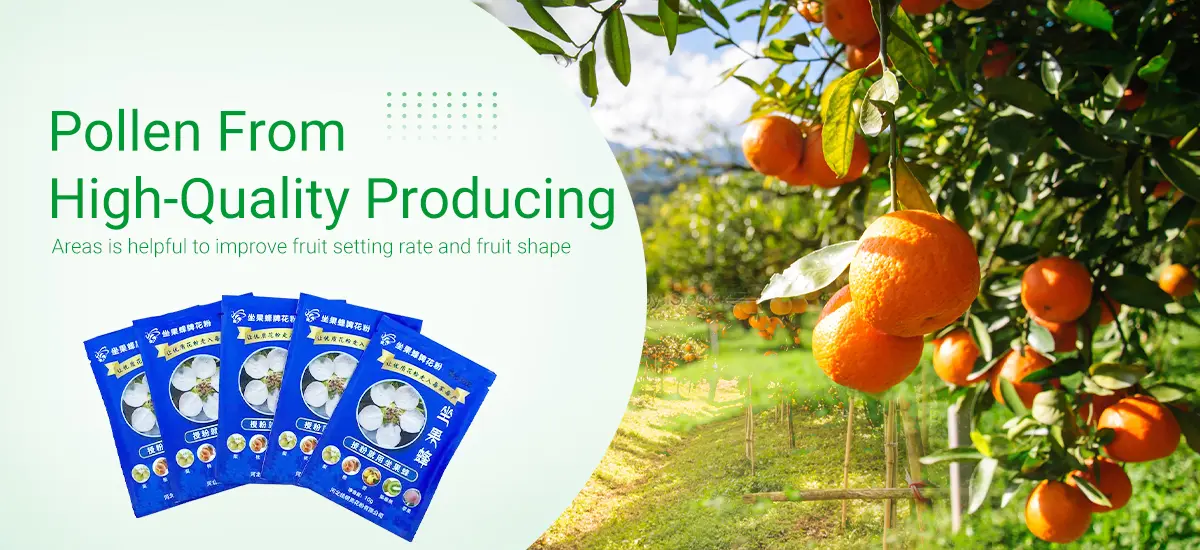Nov . 10, 2024 18:56 Back to list
Pear Pollen Role in Orchard Pollination in Taiwan's Agricultural Practices
The Role of Pear Pollen in Orchard Pollination in Taiwan
Pollination is a crucial process in the lifecycle of flowering plants, particularly for fruit-bearing trees like pear (Pyrus spp.). In Taiwan, the cultivation of pears has gained significant traction both for local consumption and export. Understanding the role of pear pollen in orchard pollination is vital for improving fruit yield and quality. This article delves into the importance of pear pollen in pollination, the implications for orchard management, and the challenges faced by pear growers in Taiwan.
Importance of Pear Pollen
Pear trees are generally self-incompatible, meaning that they require pollination from different varieties to produce fruit. The pollen from one pear variety can successfully fertilize the ovules of another, thereby facilitating fruit set. This biological phenomenon underscores the importance of pollen diversity within orchards. In Taiwan, the selection of compatible pear varieties is essential for maximizing pollination efficiency.
Pollination not only enhances fruit set but also affects the quality and size of the fruit. Proper pollination can lead to better seed development, which in turn influences the overall health and vigor of the pear tree. Thus, ensuring an adequate supply of high-quality pear pollen is vital for orchard productivity.
Factors Influencing Pollination Success
Several factors can influence the efficiency of pear pollen in orchard pollination. These include environmental conditions, the presence of pollinators, and the timing of flowering. In Taiwan, the subtropical climate provides a favorable environment for pear cultivation, with distinct seasons that influence flowering time.
The interaction between different pear varieties is also critical. For instance, the cross-pollination between early-blooming and late-blooming pear varieties can enhance the overall pollination success in an orchard. Growers must carefully plan their planting strategies to ensure a harmonious flowering period that maximizes cross-pollination.
Furthermore, the role of pollinators, particularly bees, cannot be overlooked. Bees are the primary pollinators for pear trees, and their population health directly affects pollination rates. Ensuring a healthy bee population through sustainable agricultural practices is essential for effective pollination.
pear pollen for pollination in orchards in taiwan

Orchard Management Practices
To optimize pollination, orchard management practices must be tailored to enhance the availability of pear pollen. One effective strategy is planting a diverse range of compatible pear varieties within the orchard. This not only ensures adequate pollen sources but also cultivates a more resilient ecosystem that can withstand pests and diseases.
Additionally, maintaining the health of pollinator populations is crucial. This can be achieved by minimizing pesticide use during the flowering season and incorporating pollinator-friendly practices like planting wildflowers and avoiding monocultures. Such strategies not only benefit pears but can also enhance biodiversity in the area.
Monitoring flowering patterns is another essential aspect of orchard management. By keeping track of the bloom periods of various pear varieties, orchardists can harmonize planting schedules to maximize opportunities for cross-pollination. This can significantly increase the yield and quality of the harvest.
Challenges Ahead
Despite these strategies, pear growers in Taiwan face several challenges. Climate change is altering weather patterns, which can disrupt traditional flowering times and affect pollination success. Additionally, the decline in pollinator populations poses a serious threat to effective pollination.
Moreover, with the increasing competition in the global market, Taiwanese pear growers must not only improve pollination techniques but also adopt quality control measures to meet international standards. This may require investment in research and development to explore innovative solutions that enhance the efficiency of pollination.
Conclusion
In conclusion, pear pollen plays a fundamental role in the pollination process of orchards in Taiwan. Understanding the intricacies of pollination, enhancing orchard management practices, and addressing the challenges posed by environmental changes are crucial for the sustainable growth of pear cultivation in the region. By prioritizing these aspects, Taiwan can continue to thrive in its pear production, ensuring both high-quality fruit for consumers and economic benefits for growers. Effective pollination management is not just an agricultural practice; it is a commitment to preserving the natural processes that sustain our ecosystems.
-
High-Viability Male Kiwipollen for Sale | Boost Yield
NewsAug.06,2025
-
Eco Fruit Paper Bags for Peak Freshness | Durability Focused
NewsJul.31,2025
-
Pollen Peach Tree for Pure Pollination and High-Quality Peach Pollen
NewsJul.30,2025
-
Premium Cherry Pollen for Pure Pollination & Different Types
NewsJul.30,2025
-
Artificial Pollination Solutions for Various Plant Pollen Types
NewsJul.29,2025
-
Artificial Pollination Solutions for All Plant Pollen Types
NewsJul.29,2025